- Home
- Catherine Bateson
Lisette's Paris Notebook Page 19
Lisette's Paris Notebook Read online
Page 19
I wanted to see his face. I squirmed around slowly. He sighed again and I stopped moving. Little by little I shifted gently until I was facing him. I was nearly off the bed by then so I put my arms around him to stop myself from falling out. In the half-light, I could see his face clearly. He looked younger asleep, his mouth just slightly open. His eyelids were almost blue and his eyelashes enviably thick. I wanted to kiss him. Would he wake up? I moved slightly and touched his mouth with mine. I kept my eyes open. His lids flickered and in half a second he was kissing me back, looking at me steadily.
We were half-undressed when Hugo stopped. ‘I wasn’t expecting this to happen,’ he said. ‘Have you got anything?’
‘What do you mean? A condom? Well, no.’ I didn’t want to stop. ‘Can we get one?’
Hugo kissed me again, and pulling away one hand, fumbled for his phone. ‘It’s so late,’ he said. ‘Nothing will be open.’
‘Really?’
‘Ssh. Let me think.’ He put his hand on my mouth – as much to stop him kissing me again as anything else, I guessed. ‘Nowhere I can think of. You’re right, Lise, you are the queen of bad timing.’
‘It’s not my fault!’
‘I know. It’s equally mine. I’m sorry. I shouldn’t have said that. Come on, let’s get out here.’ He pulled away and put his shirt on. ‘Let’s go and see a late night movie.’
‘A movie?’
‘Anything. Let’s go for a walk. I don’t care.’
‘I can’t walk,’ I said. ‘I’ve got a blister. I told you.’
‘Well, I can’t stay here,’ Hugo said. ‘We’ll end up . . . and look what happened to your mum.’
‘It’s not contagious,’ I said snappily.
‘It might be genetic.’ Hugo grinned at me. ‘It’s not worth the risk, Lise.’
‘It just seems contradictory,’ I complained. ‘Come home with me, come to London. But let’s not take a chance on this.’
‘Lisette! Seriously?’
I looked up at him. ‘Sorry,’ I said. ‘You’re right. I’m just being sulky and stupid. I don’t want to walk anywhere, though.’ I held my foot up for him to see my huge blister.
‘Can’t you put a plaster on it?’
‘I don’t have any,’ I said.
‘I just need a circuit breaker.’
I tugged his arm. ‘We don’t have to do the full circuit,’ I said. But the joke fell flat.
Hugo just looked at me before lying down next to me, his arms folded across his chest like some young, dead knight. ‘You win.’
I scrunched myself up next to him. ‘It wasn’t very funny,’ I admitted.
‘It’s all kind of messed up,’ he said after a long silence.
I thought of what Ami had said after the whole Ben incident. ‘No one’s died,’ I offered.
Hugo laughed. ‘That’s true,’ he said. ‘Come here.’
In the early hours of the morning he nudged me awake. ‘I’m going now,’ he said. ‘I’ve got pins and needles in my arm, and a cramp in my leg, but really, I just don’t think I can face Madame Christophe over breakfast.’
We crept down the stairs although I wasn’t sure why we bothered when presumably, being a clairvoyant, she knew everything anyway.
‘I don’t care,’ Hugo said, when I told him this theory. ‘It’s different her knowing from her magic crystal ball or whatever, to actually having her eyeball me in that French way over my early morning tea.’
‘We don’t have tea.’
‘There – that’s another reason. Oh Lise, don’t look like that! Of course I’d sacrifice my breakfast tea for you.’
I waved him off down the street. I felt sad because I hadn’t realised he was a tea-in-the-morning person and how would I ever get to know his habits if we said goodbye now?
It wasn’t until I got back up to the apartment that I realised he’d left Babette there, propped up on my chest of drawers. She looked a little shabby and her eyes made her appear as though she were squinting. ‘You really need some clothes,’ I told her. ‘It’s disgraceful living in just your underwear – underwear you haven’t actually changed for decades, by the look of it!’
The bed seemed much bigger without Hugo, and lonely. In the end, I put Babette in the space next to me. I wondered about the child who’d first owned her. I’d have to ask Hugo more about her, I thought. Where she’d come from and what he was going to do with her. For a brief second I let myself imagine Hugo buying dolls and me making clothes for them. Of course, I’d have to become a better sewer – but my hand stitching was neat. Mum had made sure of that. We’d live at the back of the shop, I thought sleepily. I’d become a tea-in-the-morning person and all my clothes would be vintage. I could go to university part-time and study costume history. I would bet almost anything there were universities offering that in England. Then I shook myself angrily. It was a daydream. That’s all it could be.
I had loved making doll’s clothes when I was little. Mum cut them out for me and I’d sew them slowly by hand. Mum always said I was learning haute couture techniques at seven but I knew my stitches were sloppy. Is the rest of my life like that now? I know the theory, but my practice feels shoddy.
At breakfast I picked at my croissant and ended up creating so many flakes I just swept them onto the floor for Napoléon.
‘You are feeling ill?’ Madame Christophe asked.
‘No . . . yes. A little,’ I answered. ‘It’s hard to know. I don’t feel myself,’ I ended lamely with one of my mother’s phrases. Madame Christophe leapt on my words and demanded I repeat them, in English. Then she cackled.
‘That is very good to know,’ she said, nodding. ‘I shall tell some American customer that they do not feel themselves. It is so true, too. There are often times when one is not quite oneself, but the beginnings of someone else one might become. The difficulty is always stepping forward. Will it suit? What will be left behind? Many, many times what is left behind is nothing that was really wanted.’
I refused Goldie’s offer of lunch and Mackenzie’s invitation to coffee. I put Babette in my daisy bag. Her head poked out but I didn’t care that I was too old to be taking a doll to the park. She was my talisman. I walked through the Jardin des Plantes. It was a hot, humid day. I’d looked up the weather in London earlier and seen photos of people sunbathing anywhere in the city there was a patch of sunlight, even outside the Tate Modern. Why had I looked up the English weather?
Big, clumsy bees that looked like oversized striped helicopters negotiated the flowerbeds. I wondered if they were bumblebees. There were cornflowers. They had been my Greatma’s favourite flowers. I remembered planting them with her in the sunny corner of the garden. Mum and I kept planting them, alongside Queen Anne’s lace. Mum said she supposed it was lovely, in a way, that Greatma was still so missed after that many years.
Missing people, grieving and mourning – my family was good at those things. How wasteful, I thought. How amazingly wasteful. Not my Greatma, of course – it was right that we missed her. She’d been a better mother to my mum than my grandmother had. Had my grandmother missed Mum? Who knew? Grandad used to visit secretly and bring chocolates, lollies and, once, a doll. My grandmother never unbent. Never apologised. When Grandad died, Mum went to the funeral and my grandmother didn’t even say hello to either of us. We went to her funeral because, as my mother said flatly, ‘I just want to make sure she’s dead.’
Mum and Dad. She’d missed him even after what he’d done to her. Why else keep the photos? She’d missed him and she’d hardened her heart against him just as her own mother had clenched her heart against us.
Had I found Hugo just to lose him again? And why? Just because I was stubbornly sticking to a plan that was no longer relevant? Panic bubbled through me. He would be on a train in three days going back to London. I needed more time.
I couldn’t stop thinking, so I walked away from the gardens only to arrive at another garden. I could just garden-hop around Paris, I thought, but
I wasn’t headed into the Tuileries with its lounging visitors lifting their faces to the sun. I went, instead, to L’Orangerie and sat in front of the Monet waterlilies for a long time, first in one room and then in the other. I didn’t even look at the paintings properly, just let the colours wash over me like water itself. I was drenched in colour and that was enough to quieten my crazed mind. The questions stopped shouting at me and began to whisper, instead.
A text dragged me back to the real world. It was from a number I didn’t know and, when I opened it, it was written in French. Maxine! I read through it three times before I was absolutely certain that she was inviting me to meet her so she could show me the best fabric stores in Paris that afternoon. No time to do anything but hop on the metro. I didn’t even need a map these days! Of course, I was still carrying Babette but Max was probably used to people carrying around strange things.
And, indeed, she exclaimed when she saw the doll, ‘Oh là là,’ she said, ‘she is fantastique. Hugo must have been very pleased to find her.’
‘He didn’t really say,’ I said. ‘I was wondering if I should make her some clothes.’
‘But of course, she will be much more elegant that way. Do you know anything about her?’
‘Nothing – except she’s got real hair and her body’s soft.’
Max nodded. ‘This is correct,’ she said, ‘she is possibly from the late nineteenth century. A little worse for wear and those eyes are not her best feature. So not a Jumeau Bébé. Such a pity – that would have been worth something. Perhaps she is from a mystery maker – that is what they say when there is no maker’s mark.’
‘Wow! You know so much.’
Max shrugged. ‘It is my business,’ she said simply. ‘You would learn, too, if you were in this world. You would learn quickly.’
‘I’d love to,’ I told her. ‘I think I’d love that more than I would art. It feels more part of me. As though I could make it my own. There is something very personal about it.’
‘This is true,’ Max said, giving Babette back, ‘this is very intimate, this handling of small, precious things. But, come – let us look at fabric. I want to buy something for new cushion covers – those I can make. You might find something for the doll?’
We headed to what Max told me was the fabric district of Paris – and she was exactly right. Each shop was filled with tables of fabric. There was one place that had five floors – one whole floor devoted to upholstery and home decorating fabrics. It was here that Max found some heavy cotton for her cushions. It was retro fifties print – abstract shapes, which reminded me of furniture, on a grey-green background interrupted by coloured brushstrokes of red and yellow. Then we looked for something suitable in the remnants pile for Babette.
‘She should be wearing a . . . how do you say it?’ Max outlined a crinoline shape with her hands. ‘She is from that time.’
Eventually we found a remnant of some kind of heavy self-patterned brocade, some lace and some silk ribbon, which was delicately dyed.
‘It is good,’ Max pronounced, ‘but how will you make the crinoline like a bell?’
‘Wire,’ I said, ‘and look – these tiny buttons would be perfect, too.’
‘She will need a hat. Women in those years would not go out without one.’
‘I might make a bonnet. I’ve been looking up dolls on my laptop. Even the ones that weren’t meant to model the latest fashions were beautifully dressed. I hope I can make something half as good!’
‘I am sure you will,’ Max said. ‘Now, we must have a glass of wine, for that is what Parisian women do after shopping. If you have time, Lisette?’
We sat outside but Max directed her attention at me, rather than the passers-by. ‘Santé,’ she said and we chinked glasses delicately. ‘So, Lisette,’ she said after a sip of wine, ‘Edouard and I have been wondering. It is not our concern, it is true, but we are fond of Hugo. We wonder what you are thinking – is it for you a holiday romance?’
‘No,’ I said straight away. I couldn’t imagine having a holiday romance. That implied a resort and cocktails. It wasn’t Hugo, lying in my bed, with my head on his shoulder. It wasn’t him saying, This is all messed up. It wasn’t us.
‘But you are not joining him in England.’ Max frowned into her wine.
‘If I went to London with Hugo – then what? I’d come back to Paris by myself and then return to Melbourne? It would be worse than never going. At least here I have Mackenzie, Goldie and Madame Christophe.’
Max cocked her head and shrugged. ‘A ticket?’
‘I have to go home sooner or later,’ I told her. ‘There’s the question of visas.’
‘But is this what you want?’
‘I don’t know. Well, no. It’s not what I want.’ I’d said it. Out loud. The words hung between us. I could practically see them.
‘Life.’ Max patted my hand and smiled – although why I didn’t know. ‘It is sad, yes? But if you do not want things to be like this, you will find a way to make it different.’
That sounded to me like someone urging you to think positively as though that alone could change things, but I liked Max and I wanted her to like me, so I smiled and nodded as though it were that simple.
When I got back to my apartment, I took out the fabric and haberdashery I’d bought and began a search on how to make clothes for Babette. One website instructed that an old doll would have to have authentic clothing and there was a warning to use only natural fibres.
I undressed Babette carefully and washed her underthings with my shampoo. I couldn’t tell if they were authentic or not, but they were grubby. She didn’t seem to have a mark on her, which meant that Max was probably right, and she was from a mystery maker. When I compared her to some of the examples I saw on Pinterest, I could clearly see her flaws – those off-centre eyes! – but I loved her even more.
I’d bought brown paper, scissors, a tape measure and a lovely fat pencil from the BHV. I carefully noted her measurements and then did some rough sketches. A crinoline was too hard, I decided, and one of the websites I consulted advised that these kinds of dolls were often dressed in a simple, lowwaisted style of Edwardian dress. There were lots of examples. I knew the brocade would hold pleats well and so I worked out a rough pleated-tunic pattern. If I did that, I reasoned, I could fashion a jacket and no one would have to know the tunic had no sleeves.
I cut the pattern from the paper first to make sure it fitted. Then I cut it from the brocade. The best thing about making doll’s clothes is that you don’t need much space. I wouldn’t have been able to cut out anything for myself in the tiny room, but I could simply use the top of my chest of drawers as a table for Babette’s clothes. This was a familiar activity – Mum had taught me to sew doll’s clothes before she allowed me to use any of her sewing machines. I had gone from painstakingly stitching along a pencilled line to making my own patterns, just as I was now. Why had I ever stopped? The last doll’s clothes I’d made was an over-the-top Japanese streetwear outfit for a doll I had given to Ami for her birthday when we were both in Year Nine. She’d loved that, and pestered Mum until Mum had taught her to sew too.
I was trying to work out how to do the facing when Hugo knocked at the door.
‘That’s so fabulous,’ he said when he saw the tunic.
‘Do you think it looks too much like furnishing brocade?’
‘They wore that kind of stuff, though. Heavy, so it wouldn’t have to be washed as much. Lisette, don’t you feel how right we are together?’
I snatched the tunic from him, nearly stabbing my finger with a pin. ‘You can’t ask me that all the time,’ I said. ‘You can’t do this, Hugo.’
‘I’m not asking you all the time. I’m asking one more time. That’s all.’
‘I can’t go. And even if I did, I don’t see how it would solve anything. We’d have a . . . holiday romance. That’s what it would be, Hugo.’
‘I’m not looking for a stupid holiday romance. What is that,
anyway? And no, I don’t understand. I’d do almost anything for this to work. I’d stay longer in Paris if I had an option to but I don’t – I’m running out of money.’
‘You’re running out of money? Hugo – I have plans for my life. Why are my plans less real than your business?’
‘You’re undecided, aren’t you? I didn’t think you’d settled on what you wanted to do?’
‘I’ve got nothing in England.’
‘You’d have me. You’ve got your stepmother in Wales.’
‘She’s not my stepmother. I don’t even know her!’
‘Sorry.’
‘I just thought that if you came with me, we could see what happened. See what we might be together. You never know what will happen if you don’t take a chance.’
‘We’d win TattsLotto?’
‘It sounds stupid,’ Hugo admitted, sitting on the bed. ‘But I just thought having more time might present us with more options.’
‘I don’t see how.’
‘I don’t know either, but sometimes you just have to trust in the universe, or something.’
‘Like think positively?’
‘Why not? I might sell something big and make some real money. You might walk into a job. You might look around London or Yorkshire and think, this is where I want to be for the next while. We might look at each other and say this is who I want to be with. We might do that if we are together. Aren’t you willing to risk that? I am.’
‘No. No, I’m not.’ My heart sank as I said it – but how could I? How could I put my trust in something so intangible? How could I put my trust in this man, this boy, with his frayed collars and cuffs and his beautiful eyes? I wasn’t my mother. But I also ignored the voice in my head whispering that Hugo wasn’t my father either.
‘I have to go,’ Hugo said, standing up and reaching the door in one stride. ‘I have to arrange some things. I’m supposed to be working. See you later, Lisette.’
‘Hugo—’
‘Don’t walk me downstairs.’ He held his hand out to stop me from moving towards him. ‘I’m sorry,’ he said. ‘You can’t take the risk. It’s bad timing. I understand that.’

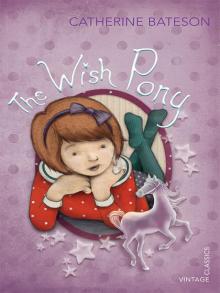 The Wish Pony
The Wish Pony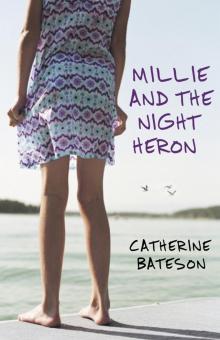 Millie and the Night Heron
Millie and the Night Heron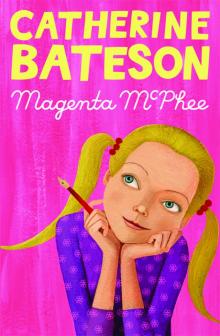 Magenta McPhee
Magenta McPhee Painted Love Letters
Painted Love Letters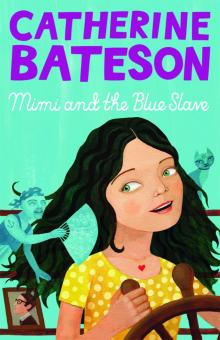 Mimi and the Blue Slave
Mimi and the Blue Slave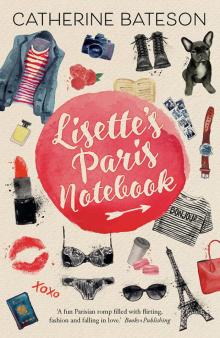 Lisette's Paris Notebook
Lisette's Paris Notebook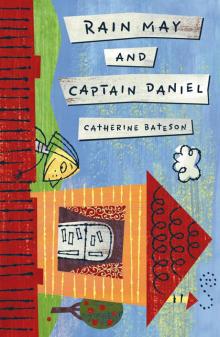 Rain May and Captain Daniel
Rain May and Captain Daniel